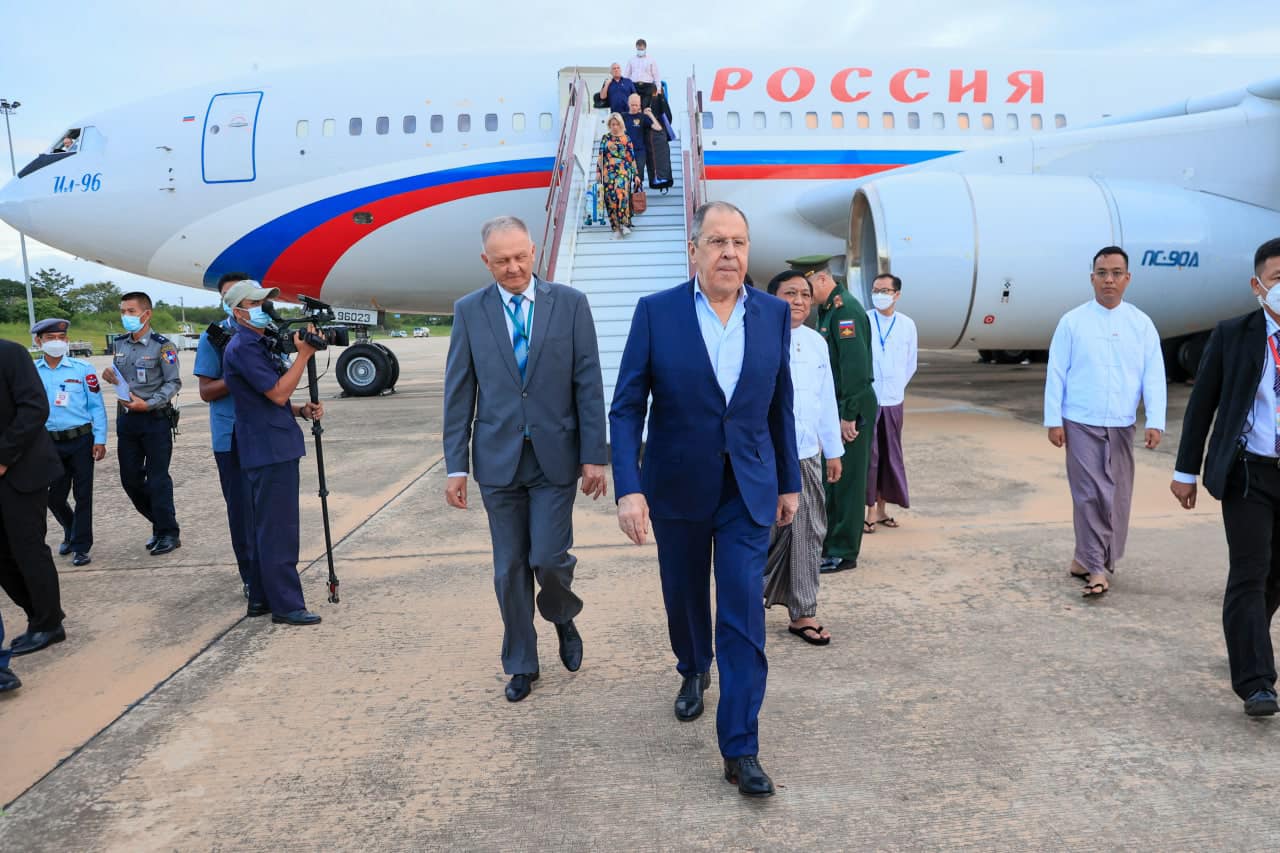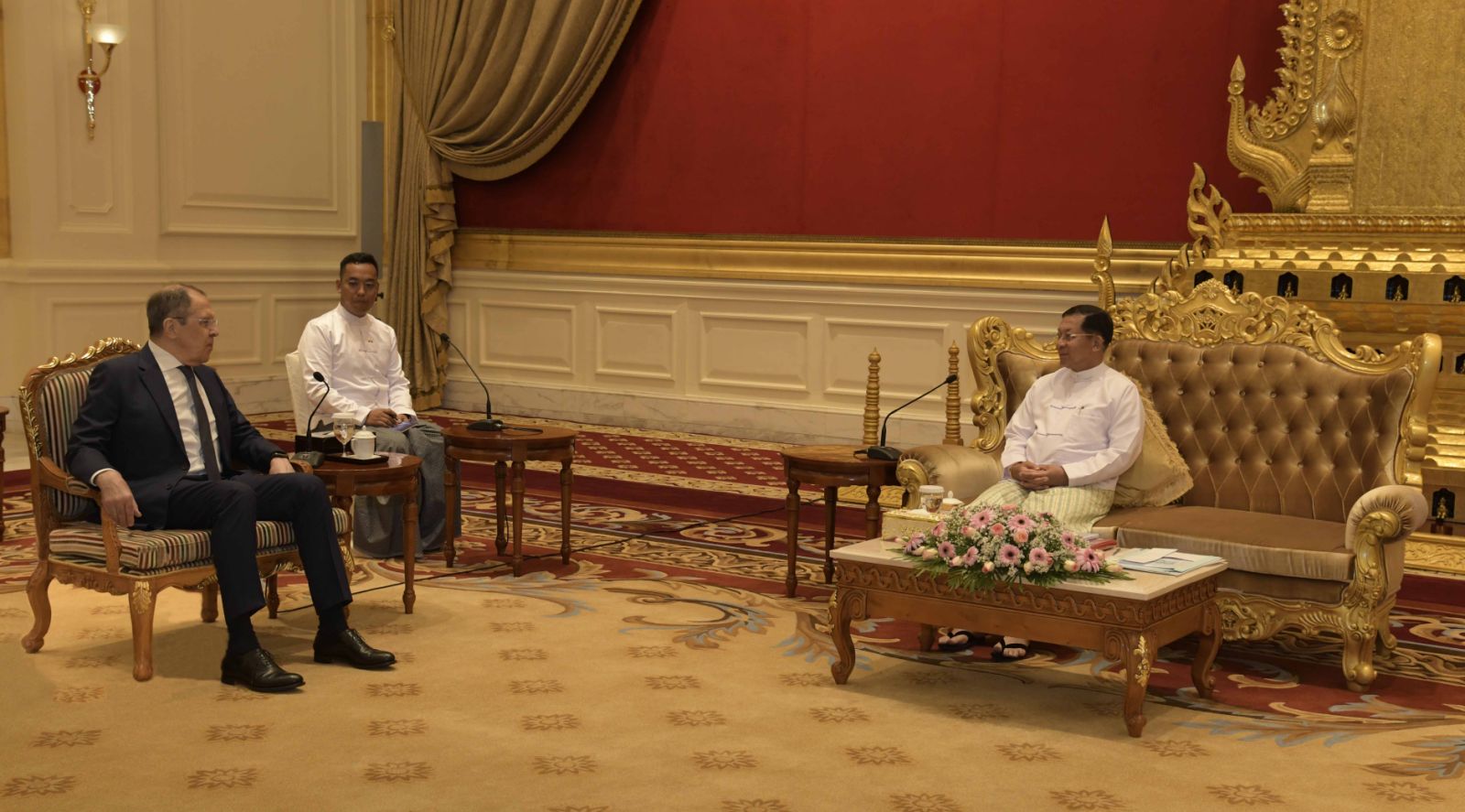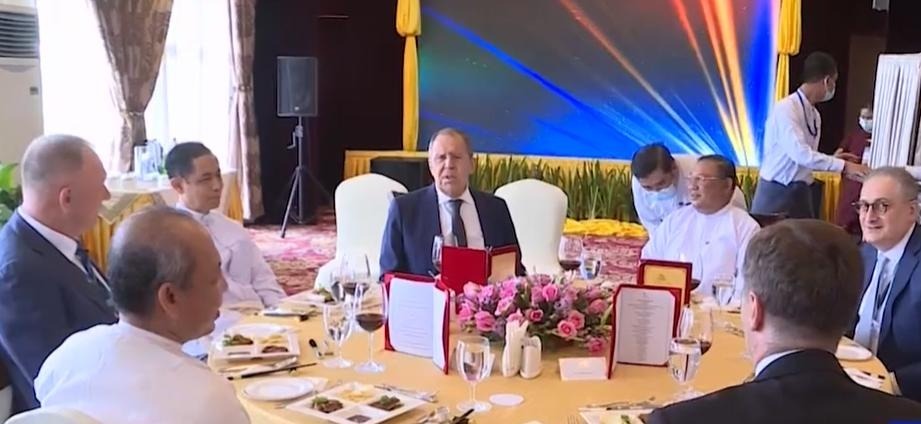It might sound cynical, but with Myanmar becoming more like Syria or South Sudan every day, it seems only fitting that Russia’s foreign minister visited Naypyitaw last week to provide some much needed moral and political support to the condemned regime.
When Myanmar held its Armed Forces Day on March 27 last year, commander-in-chief and coup leader Senior General Min Aung Hlaing in his speech called Russia a “true and loyal friend”. Why?
Russian Deputy Defense Minister Alexander Fomin was the highest-ranking foreign dignitary at the event in Naypyitaw. Two days later, Russia called Myanmar a “reliable ally and strategic partner.”
When Russia invaded Ukraine, the regime backed the Kremlin, its spokesman saying that Russia was still a powerful nation that plays a role in keeping the balance of power for world peace.

To this day, Russia remains one of the key arms suppliers to Myanmar’s military, while Russia has provided a postgraduate education to at least 7,000 Myanmar officers since 2001.
Moscow has provided fighter jets, helicopters and air defense systems to Myanmar and it is no secret that the regime leaders prefer military hardware from Russia over China.
But now, bilateral ties are not limited to military-to-military relations. Moscow seeks to deepen diplomatic, economic, trade and security relations with Myanmar.
Last week, Moscow’s top diplomat Sergey Lavrov visited Myanmar and met with top leaders including Snr-Gen Min Aung Hlaing.
Isolated Myanmar’s leaders, shunned from a regional ministers’ meeting that was being held in Cambodia at the same time, welcomed Lavrov with broad smiles, to demonstrate that the regime has a powerful friend.
However, the handshake between Lavrov and Min Aung Hlaing looked more like a meeting of partners in crime. Lavrov’s stopover in Myanmar before the minister’s attendance at the ASEAN regional meeting no doubt set alarm bells ringing in regional capitals and for Myanmar’s opposition.
During his brief visit, which was held amid high security, the regime laid out the red carpet for Lavrov, with two military helicopters escorting his convoy from the airport to the hotel and his meetings.
During his working visit, regime Foreign Minister Wunna Maung Lwin also hosted a working luncheon for the Russian delegation at the Aureum Palace Hotel, owned by Myanmar crony Teza, one of the main brokers of arms deals between the Myanmar military and Russia.
Lavrov made clear where Moscow stands to Myanmar ministers, who could not conceal their delight at the working luncheon.

He said the Russian government was “in solidarity with the efforts aimed at stabilizing the situation in the country,” adding, “We appreciate the traditionally friendly nature of our partnership, which is not affected by any opportunistic processes.” Russia and Myanmar established diplomatic relations in 1948 and next year the two countries will celebrate the diamond jubilee anniversary of their ties.
Lavrov described Myanmar as a “friendly and longstanding partner”, adding that the two nations “have a very solid foundation for building up cooperation in a wide range of areas”.
Calling Russia, a “true and loyal friend” is not wrong; in fact, Russia (along with China) has been loyal in backing the regime at the UN Security Council. As permanent members of the council, the two major allies have exercised their veto power to block international sanctions against the Myanmar regime.
In his remark, Lavrov made no mention of the junta’s daily brutal campaign and air raids against civilians and the opposition, which is understandable; Russia’s sophisticated jet fighters and helicopters have been deployed to attack the population, villages and armed resistance in Myanmar.
The regime in Myanmar is isolated and faces sanctions, as well as condemnation at home and abroad. It has also struggled to counter an armed resistance over the past year. Since the Ukraine invasion, Moscow faces Western sanctions and is in a long and costly military campaign there.
Min Aung Hlaing has chosen to wreak utter devastation. He has sent government leaders to prisons, including ousted State Counselor Daw Aung San Suu Kyi. Last month, he ordered the execution of prominent activists including a lawmaker. There is no turning back.
He was pleased to receive Lavrov at the Presidential Palace to show that he has a friend in a high place.
The state-run Global New Light of Myanmar described the two nations’ ambitions to become “permanent friendly countries and permanent allies” who will aid each other to “manage their internal affairs without external interference.”
But…
Dragging Russia into the conflict in Myanmar will have major consequences.

Three major players are now involved in the conflict in Myanmar: the West (chiefly the US), Russia and China.
Perhaps it is easy to read the US reaction, but how Beijing sees Lavrov’s visit will be intriguing.
In June, Chinese foreign minister Wang Yi told Wunna Maung Lwin that China pledged to support the military regime “no matter how the situation changes” in Myanmar over the coming months and years.
China’s substantial economic and strategic interests in Myanmar are vast; moreover China’s influence and political clout is, compared to Russia, extensive.
Still, while Beijing isn’t betting on the regime alone, its unequivocal support for the junta suggests its analysts believe the regime will eventually prevail over the anti-coup resistance, that outside support for the resistance movement will only prolong the inevitable, and that the regime offers the most likely route towards the stability necessary for the advancement of China’s substantial economic and strategic interests in the country.
Beijing has allies in the country, while it is expected that Moscow will stick with the regime.
Myanmar’s ethnic armed organizations in the north have forged closer relations with China and depend on the powerful neighbor. China can only increase its support to these groups. On the Taiwan issue, meanwhile, China has halted cooperation with the US over critical issues and it will be difficult to seek any understanding on Myanmar due to the escalation of tensions. Last year, the United States and China brokered an agreement that will effectively block Myanmar’s military rulers from addressing the United Nations’ General Assembly, dealing a blow to the junta’s quest for international legitimacy.
For its part, the West (including the US) supports the democratic opposition and shadow civilian government, the National Unity Government, but so far, no arms support has been involved. The US has however increased its humanitarian assistance and support for opposition and civil society groups since the coup.
The US recently asked countries in the region to engage with the NUG, which has urged the international community to provide arms to its forces fighting against the country’s military regime.
In June, the US State Department’s counselor urged the Association of Southeast Asian Nations (ASEAN) to engage with the NUG, saying the country’s political crisis cannot be resolved by engaging only with the military regime.
The US’s political support is limited, however. But the opposition in Myanmar has urged Washington to do more. Meanwhile, Russia’s assertive engagement with the regime in Naypyitaw only deepens.
Myanmar has become a playground; dragging Russia in to play a bigger role in Myanmar sounds very ominous.
You may also like these stories:
Myanmar Junta’s Executions ‘Unforgivable’
Myanmar Regime’s Execution of Democracy Activists Condemned at Home and Abroad
Executed Myanmar Democracy Activist’s Mother Recalls Last Meeting
















